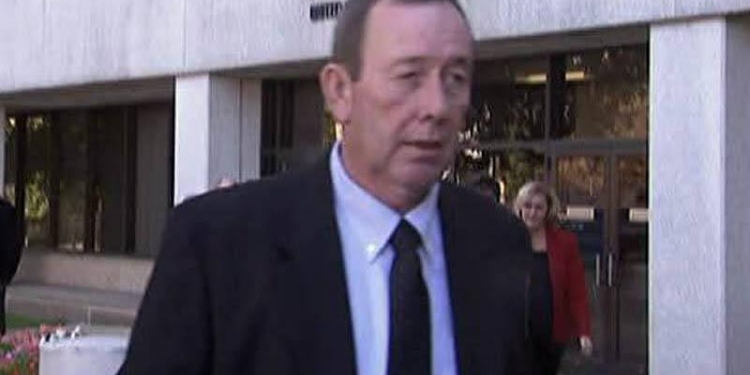Robert Carl Stokes, the kingpin of crop insurance fraud, helmed a historic cabal that took advantage of graft and corruption at all levels of agriculture to the tune of at least $100 million. ( Photo courtesy of WRAL Media )
Intent on exposing the biggest crop insurance fraud in U.S. history and hoping to flip a grower to state’s evidence, investigator Don Doles walked across a farm yard toward a Ford pickup parked beside an old shed. At the site of Doles’ approach, the farmer broke from the shed and threw open the truck’s driver-side door, lurched across the seat—one leg in the cab, one leg out—and began frantically searching inside the console. Doles had two choices: sprint for cover or give chase.
One arm draped across the steering wheel and the other flailing between the seats, the farmer suddenly shifted from manic movement to near paralysis—still as a statue—as the cold touch of a Glock 17 barrel pressed into his flesh, just behind the back of his ear, and Doles’ measured voice delivered a life-or-death ultimatum: “If you come out of that console with anything other than an empty hand, I’ll shoot you right here.”
Crime is part and parcel of any business. The adage, however, wilts as a qualifier in the face of North Carolina’s historic crop insurance debacle ranging from approximately 2003 to 2008. Jarring in scope, the corruption at all levels of farming left an indelible stain on the agriculture industry, as insurance agents, adjusters, tobacco brokers, tobacco companies and warehousemen operated as a cabal and conspired to enable willing farmers to double dip—collect on fake crop insurance claims and then sell hidden yields under the table. Remarkably, the story contains few shades of gray and is stamped by the black-and-white greed of a den of thieves stuffing a $100 million purse with coin stolen off the backs of fellow farmers.
The arrogance of a cheat is often his undoing, and Robert Carl Stokes, the kingpin of crop insurance fraud, followed suit. For several jackpot years, Stokes was a river of plenty to his farmer clients in a setup prosecutors likened to a drug cartel, but when the stench of purported failed crops caught USDA’s attention, the stage was set for a crashing curtain call filled with hijinks, wires, hidden cameras, death threats and subterfuge—triggered by the persistence of an intrepid USDA Office of Inspector General (OIG) agent. Enter Don Doles.
The Hot Zones
Raised in the Deep South, in the heart of the Peach State, Doles farmed until 1986, before taking full-time employment with the Federal Crop Insurance Corporation (FCIC), as part of a 12-member team in the nascent compliance division. After a year-and-a-half working in Kansas City, Doles moved back to Georgia, hired as an agricultural investigator by USDA OIG, a post he held until retirement in 2010, followed by a shift into private investigation.
In 2005, through the data mining efforts of personnel from the Center for Agribusiness Excellence at Tarleton State University, USDA auditors compiled a dirty dozen list of hot zones with repeated payouts—a lineup of the 12 most suspicious crop insurance agents in the U.S., all united by farmer clients with anomalous loss ratios. With four of the 12 entries located inside Doles’ geography, he immediately recognized the first three names within his region as shady individuals already on his radar: the usual suspects. However, the fourth entry was an outlier entirely unknown to Doles, and a name destined for agricultural infamy—Robert Carl Stokes.
According to court documents, in 2005-2006, Stokes filed $11,749,594 in loss claims on behalf of his farmer clients. A cursory check of the individual farm records revealed a simple calculus: Either Stokes was neck-deep in crop insurance fraud or his clients were consistently the unluckiest bunch of farmers on the planet.
Layer Cake
After reading the list, Doles immediately telephoned a well-heeled associate at Risk Management Agency (RMA) in Washington, D.C. “I asked him if he’d heard of this Stokes,” Doles recalls, “and he answered, ‘Well, that is strange. I just got a call yesterday from a guy who wants to provide information about a Robert Carl Stokes.’”
Seizing on the fortuitous timing, Doles hopped a plane to North Carolina, and met the potential informant, Danny Denton, in a church parking lot, and proceeded to listen as Denton rattled off a buck-wild tale. Denton was a contractor in the process of building Stokes an $800,000 house. According to Denton’s claims, much of Stokes’ 6,000-square foot spread was paid for in cash plucked from an office safe, courtesy of crop insurance fraud and kickbacks from farmers.
The steady drain of construction expenses eventually skinned the safe, and on a whim, Stokes asked Denton to go with him to dip into more funds. With Denton riding shotgun, a brazen Stokes drove to a farm and picked up a knot of bills from a grower, all the while detailing the mechanics of the scheme to Denton: Stokes helped farmers file false insurance claims in exchange for 10% of the loot, and also got a cut when crops were sold off-record, essentially by shifting yield. It was a more-the-merrier party that sucked in illicit profit by the millions—but the clock was about to strike midnight.
“From the get-go, we had 10 names of farmers involved,” Doles recalls. “It’s really hard to fail on all your crops all the time. It was obvious in the records that these farmers were collecting on every crop every year. That’s how the whole ball got started rolling.”
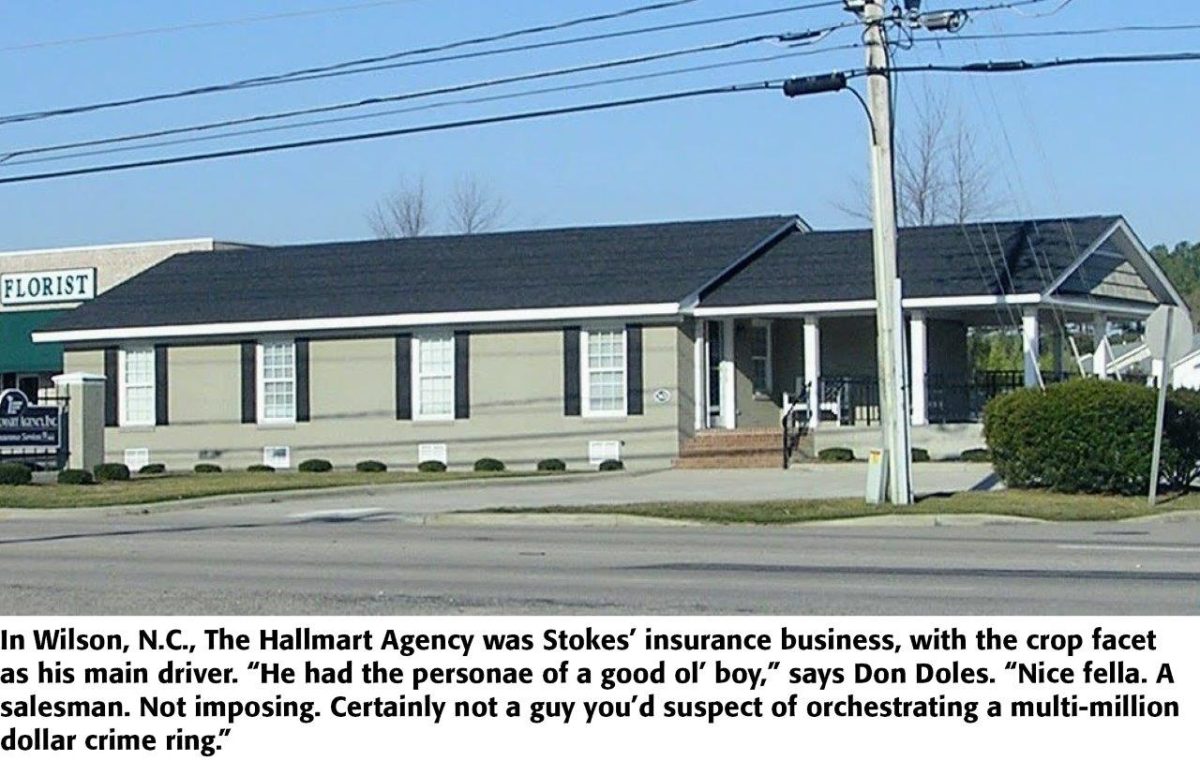
In 1989, Doles had worked his first crop insurance investigation in Alma, Ga., featuring a parade of farmers, grain dealers, agents, fertilizer salesmen and bankers. Thirty years later, the Stokes case would consist of the same basic ingredients—injected with a $100 million dose of steroids. Doles was about to endure six years of hotels, stakeouts, and backroad meetings. “DOJ called it a $100 million case, but that was just what we got back in fines, restitution and forfeitures. I believe it was larger—much larger,” he contends. “I’d say $100 million was a drop in the bucket compared to what really got stolen.”
“Crop insurance is something not many people understand. It’s not hard, but it’s just not something people know much about. These insurance cases are almost never sexy for court, and usually put jurors to sleep, but this one had audio, video, characters, threats and a pile of money. This one had it all,” Doles notes.
The case would eventually land on the desk of Josh Howard, former federal prosecutor for the Eastern District of North Carolina, who specialized in white collar crime, but carried deep knowledge regarding the nuances of agriculture, and was the first male in his family to grow up away from a tobacco farm. (Immediately following high school, Howard measured tobacco fields for quota compliance in the Greene County, N.C. USDA-ASCS office.) Howard understood crop insurance, federal programs and the pipeline—i.e., he knew how to navigate the levels of the tobacco layer cake: “In Washington, D.C., the crime is political. In Charlotte, it’s bank fraud. In the farming communities of eastern North Carolina, it’s crop insurance fraud. If you do what I do and you’re smart, you listen to guys like Don Doles to find out what happened.”
“Crop insurance fraud never surprises me,” Howard continues, “but this case was bigger than anything I’d ever handled or even heard of. There were just so many people involved at so many levels and the warehouses were involved neck-deep. Some of those warehouses are right across the street from the best BBQ joint in Wilson, called Parker’s. I couldn’t go to Parker’s anymore for several years afterward—I was afraid of who I’d see in there.”
“Damn Near Impossible”
In Wilson (pop. 50,000), N.C., Stokes ran The Hallmart Agency, Inc., selling crop, car, home, and life insurance—with the crop facet as the largest portion of his business, and tobacco as the centerpiece of his insurance fraud. He carried an ever-present supply of yellow legal pads in his vehicle, keeping a paper trail of farmer names and dollar amounts promised to each operation.
“He had the personae of a good ol’ boy,” Doles said. “Nice fella. A salesman. Not imposing. Certainly not a guy you’d suspect of orchestrating a multi-million dollar crime ring.”
Directly linked with Stokes was his business partner, Mark Pridgen, who generally served as a middle man and sold crop insurance directly to farmers (although he had no license). According to a 2009 federal indictment, Pridgen “received commissions earned on the policies he sold through The Hallmart Agency, Inc. The commission payments to him were disguised in that they were paid through business entities in his wife’s name.”
Also in league with Stokes was Pridgen’s ex-brother-in-law, Jimmy Sasser, an adjuster willing to falsify damage reports in exchange for cash payments. At least three farmers would testify they paid Sasser between $400-$2,000 to inflate hail losses. (The testimony was a drop in the bucket. During his 2013 sentencing, Sasser was hit with a seismic restitution order of $21,045,917.)
Stokes demolished the standard checks and balances of crop insurance by greasing palms at all levels of the system. The scams took various forms, but paralleled a general framework: Prior to the season, a farmer insured a crop (tobacco) with Stokes. “Let’s say it’s a 2,000 lb. guarantee per acre and the price the farmer gets is $2 per pound. Therefore, for every pound the farmer loses short of 2,000 lb., crop insurance will pay $2 per pound,” Doles notes.
Later in the year, at harvest, the given farmer might grow 2,500 lb. per acre, but only report 1,000 lb. per acre. The farmer is 1,000 lb. per acre short multiplied by a factor of $2. Therefore, according to legitimate insurance numbers (minus the premium), he is owed $2,000 per acre of tobacco, Doles explains.
However, the math indicates 1,500 lb. of crop remains hidden in a barn or tucked out of sight, primed to drop into the black market. “The farmer goes to Pridgen or somebody willing to buy illegal tobacco, and sells it in somebody else’s name. The buyer is not going to pay $2, but will sure pay $1 per pound. The person acting as dealer hauls off the tobacco bought at $1 from the farmer and sells it to a big tobacco company that snaps up great tobacco for $1.75, even though they know it’s shady.”
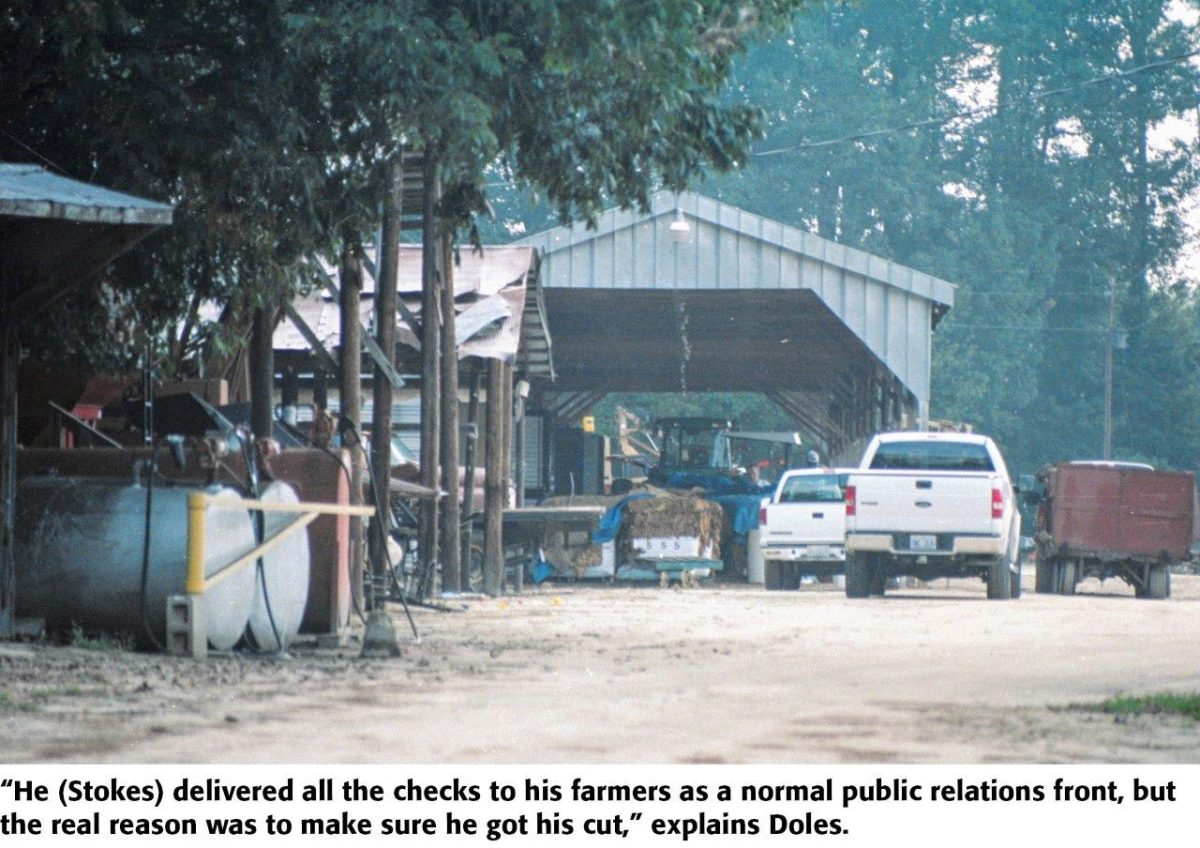
The original farmer is pulling $3 per pound and everyone else in the chain is making money hand over fist, but what about all the floating checks? For example, if Pridgen gave “farmer A” a fat check in the name of “farmer B,” how was the evidence hidden from the IRS? Stokes had devised a means to ensure that illicit gain was sweetened to tax-free illicit gain. “He started a check-cashing business in 2002,” Doles describes. “It was millions of dollars in checks cashed with no CTRs (currency transaction reports). Stokes took care of it all.”
Stokes personally filled out all crop insurance forms and knew how much each farmer was expecting in return. Essentially, Stokes was working the claims in reverse by calculating how much money was needed in return, versus how many pounds of tobacco would need to be absent. “It’s not easy to do,” Doles says, “but he’d done it so many times and learned how to get it right.”
Although he knew the contents of Stokes’ playbook and had a growing roster of cabal members, and an informant, Doles knew the evidence wouldn’t play before a judge. Frustrated, Doles recognized the legal reality: He could gather records and trace the path, but there would be no conviction without an active source on the inside. Denton, as informant, was willing to pass Doles information, but unwilling to provide concrete evidence. “I saw a bunch of these organized groups in small towns during my career and they’re damn near impossible to break from the outside,” Doles says.
At the end of 2005, Dole’s FCIC boss in Atlanta bluntly asked for an update: “Where is the case going?”
“Nowhere,” Doles answered. “I know exactly what they’re doing, but I can’t get inside.”
With heavy regret, Doles typed out a closing memo, but just as he prepared to shut the active investigation down, the entire case went nuclear. The mole was ready to dig—Denton was going undercover.
Fakes and Failures
Doles recognized the danger inherent in a full-fledged undercover role, and made certain Denton understood the gravity of the situation. “I told him (Denton) you may never be able to live in Wilson County again, ever,” Doles recalls. “Your life may be in danger. Take some time and think this over.”
Two weeks later, Denton answered in the affirmative, and the investigation went into high gear, beginning with a wire and audio recordings of Denton and Stokes. Doles wanted to obtain video by using a camera hidden inside a white button, but the effort was stymied by color. “My informant’s shirt that we wanted to use had black buttons, so we actually went to the store and bought whites to sew on, and they were women’s buttons, but they did the job and let us hide the camera,” Doles says.
And the video? Invaluable: Numerous recordings of Stokes and Pridgen counting money and splitting profits. Significantly, Denton was not paid for his undercover activities. He was occasionally reimbursed for gas and cell phone bills, according to Doles, but he never asked to be paid for his services. (Denton died in 2014, of natural causes at 61, and his family was denied a percentage of the money recovered or saved due to information obtained by Denton.) “Basically the government got the benefit from all of Denton’s hard work, and never paid for any of it,” Doles notes.
With the frequency and consistency of claims, Stokes grew increasingly nervous. He had no clue Doles was cold-nosing him, but he knew OIG was tracking the data and realized his adjusters (three on the payroll, although only two eventually faced prosecution) were hot. He needed a clean adjuster and Denton was the opportune choice. “We actually sent Denton to school to be an adjuster,” Doles explains, “but the legal department of OIG said we couldn’t use him because we’d be cheating the insurance company out of the services of an adjuster. It was a stupid civil legal block. That’s when we let him grow a fictitious tobacco crop, instead.”
Stokes was still short on the house construction bill, but rather than pay Denton directly, Stokes devised a payoff through crop insurance by pretending Denton was a farmer, according to Doles: “We take out a crop insurance policy in your name for tobacco. The crop will fail and you’ll get $26,000.”

Since Denton had no ag operation, no farmland and no tobacco, Stokes performed a bit of pencil magic, and claimed 30 acres for Denton that actually belonged to a legitimate farmer. “That 30 acres made a great crop and Stokes sent out an adjuster and they wrote it up as failed,” Doles notes.
Counterfeit warehouse receipts were still needed to show Denton had grown a crop; literally paperwork to attach to the claim. Stokes and Denton went to Liberty Warehouse and spoke with owner Kenneth Kelly, explaining the nature of the false claim and the need for a receipt. Kelly agreed to provide two fake sale bills in return for $1,500 in cash, according to Doles. (Kelly was later charged with conspiracy to launder money and pled guilty in 2008.) Stokes took the sale bills, crafted the claim, and sent Sasser to get Denton’s signature. Several weeks later, Stokes hand-delivered Denton’s check. “That was business as usual for Stokes,” Doles says. “He delivered all the checks to his farmers as a normal public relations front, but the real reason was to make sure he got his cut.”
Tumbling Dominoes
As the evidence provided by Denton piled higher and the months rolled by, Doles tracked the scope of the scheme, which stretched from the coast of Carolina into Kentucky and Tennessee. “It went so far beyond farmers,” Doles explains. “It was tobacco buyers, tobacco company officials, bankers, check cashers, adjusters, and chemical salesmen. Kind of a giant, tangled web.”
The classic law enforcement problem, explains former prosecutor Howard, is encapsulated in a simple question: Who do you go after? “There’s always going to be more people involved in crop fraud than you can prosecute, particularly in this situation,” Howard says. “You have to go for the bottleneck, and that means adjusters, because they have to be involved; same thing with the warehouses. The message then gets out quick in small ag communities.”
In 2008, the web unraveled for Stokes and his cohorts, after Doles’ team executed search warrants for offices, houses, warehouses, vehicles and more, all centered on Stokes’ illegal crop insurance network. “It was like a shockwave went off in the Wilson area,” Doles remembers.
The searches were the beginning of the end, and delivered a trove of additional evidence, beyond a haul of yellow legal pads filled with names and numbers. In Stokes’ office, Doles recovered a document brazenly titled, “Plan for the Insurance.” Prepared by Stokes prior to the beginning of the crop year, it laid out how many acres a particular farmer was going to plant and in what crop allotments. The text described precisely how much how much money the aboveboard crop would bring; how much the hidden crop would generate; and how much crop insurance the farmer would receive—before the crop was even planted.
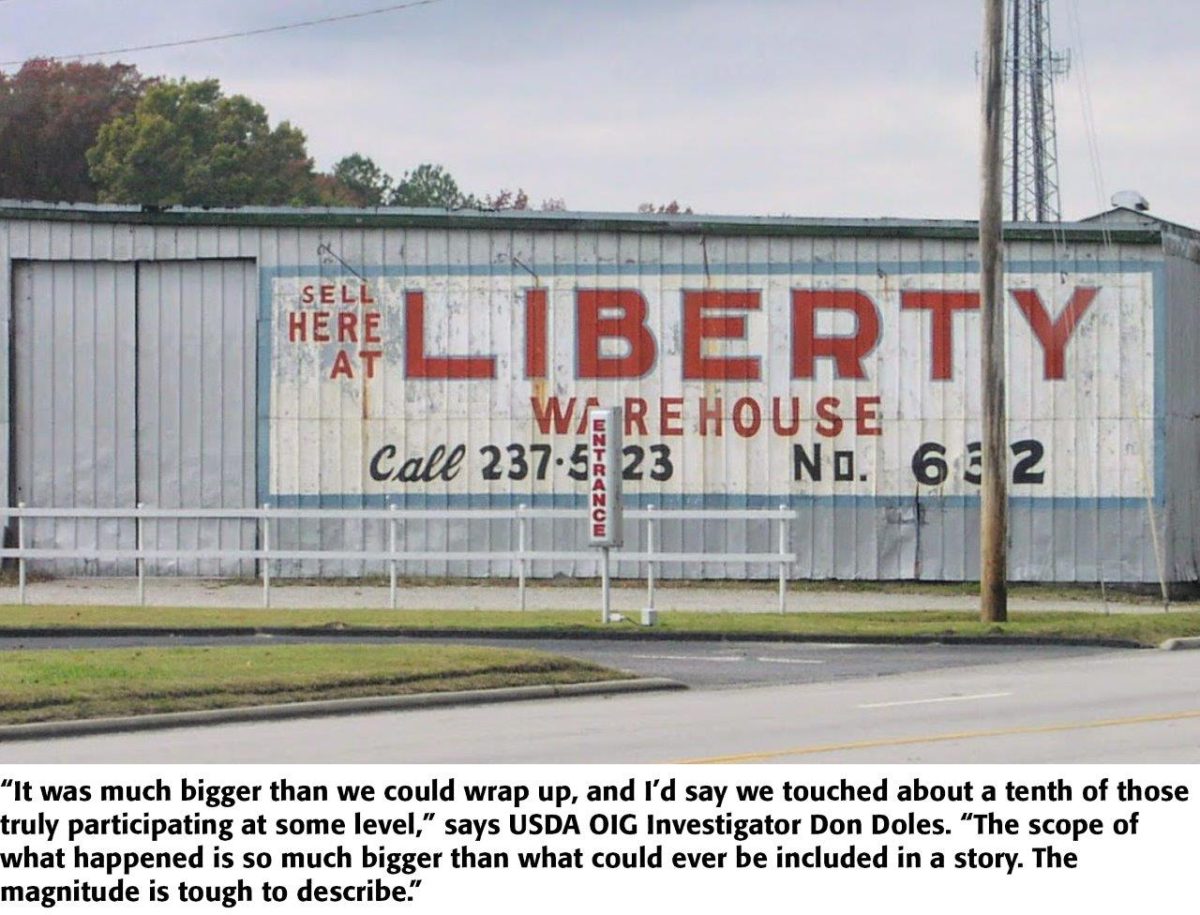
Doles left behind paperwork related to car, house and life insurance—but emptied Stokes’ office of everything related to crops, including computers and electronic equipment. It was a ready-made paper trail. “We searched his home and vehicles, too, and found the yellow legal pads in his truck. He also carried a portfolio with another yellow pad, calculator, notes and calendars.”
The calendars were scrawled with a trove of incriminating notation: “They were so important and contained several years of material,” Doles says. “Stokes put down what he did each day and who he met with and the dollar figure he got paid or paid out. He was old school and did a whole lot of writing. Once we had all the info, we indicted him and he turned himself in. There wasn’t going to be much of a denial.”
With Stokes in the bag, the dominoes began tumbling.
Felons and Pistols
Doles’ team had a binder prepared for each farmer associated with Stokes, and he wanted to play straight with each individual in an attempt to turn them to state’s evidence. Each binder held separate charges and evidence, and had the farmer’s name and photo on the front. Doles would approach each producer with a similar presentation: “I want to talk to you, but I don’t want you to say a thing. I want you to sit there and listen to me until I’m done. I’m going to show you what we’ve got in this folder. Here’s a claim, here’s what you hid, here’s where you cashed the check, here’s the money, and here’s the story. Now go get a lawyer and have the lawyer call me. We’ll sit and all go over it again.”
The blunt tactic worked each time. “I was honest and the evidence was overwhelming. All of them pled. The only question was what the charges would be, and for most it was money laundering, crop insurance fraud, false statements, and false claims. There was a spectrum of negotiation, and if they had information against others, we gave them better deals.”
With almost 30 years of cases under his belt, Doles’ life has been threatened several times. “Once things go public and big, you’re insulated. You have more risk when people think you’re the sole problem or by yourself. They think if they eliminate you, the investigation goes away.”
During the Stokes investigation, Doles stayed off the radar until his farm visits became common knowledge. Following Stokes’ arrest, Doles drove to an operation where he had already obtained video of the farmer and Stokes swapping payoff money, but Doles hadn’t done his homework prior to the visit: The farmer had a conviction for manslaughter for in the death of his brother.
Doles was carrying video footage and photo evidence, intending to show the farmer and press for cooperation, but on arrival, things went south. “I didn’t even know he was a felon; my mistake. He was not a guy to mess with and he knew who I was, and went for his truck. I could either run for my own truck or go after him. It wound up with my pistol on the back of his ear. He ended up with convictions for gun possession and crop insurance fraud.”
Abandon Ship
Stokes was indicted in 2008. According to court documents: “During the 2005 and 2006 tobacco season, Stokes, tobacco farmers, tobacco warehousemen, crop insurance adjusters, and others worked together to execute a scheme to defraud crop insurance companies of funds…and to launder the proceeds and profits of the underlying fraud.”
In October 2009, Stokes admitted his wrongdoing in court: “I’m as guilty as can be.” In January 2011, he was sentenced to 30 months in prison, followed by 18 months of house arrest, and ordered to pay $16, 582,215 in restitution. In January 2016, Stokes died, age 64.
Pridgen, Stokes’ first lieutenant, was indicted in October 2009, for a laundry list of infractions totaling $647,000: Recruiting farmers, making false crop insurance claims, hiding crops, falsifying RMA documents, back-dating crop forms, fabricating weight tickets, disguised adjuster payments, cashing checks with false payee names, forging signatures, and far more. In 2013, he was sentenced to 18 months in prison.
In January 2012, Stokes’ top adjustor, Jimmy Sasser, was charged with making false statements and committing wire/mail fraud. A year earlier, According to a 2011 criminal complaint filed by Miles Davis, a special agent with USDA-OIG, Sasser threatened Pridgen after his ex-brother-in-law opened up with authorities: “Sasser told at least one person on two separate occasions that he intends to do ‘whip [Pridgen’s] ass’ because Pridgen is cooperating with the government and ‘telling on everybody.’ Sasser told this person that he carries a bat and knife in his truck and that sooner or later he will get Pridgen.”
Sasser, who lived within four miles of Pridgen, left his former associate a series of threatening voice mails, cited in the complaint, including, “you better g** d***** be scared ‘cause them f****** feds ain’t goin’ to protect you forever.”
Again, from Davis’ complaint: “Sasser tells Pridgen that he (Pridgen) is the most hated person in Wilson County and everyone knows what he has done…Sasser tells Pridgen that he (Pridgen) better hope he (Pridgen) goes to prison because Pridgen’s ‘ass is mine when you get out.’ Sasser tells Pridgen to ‘tell your fed friends that too.’”
As a result of receiving cash payoffs from 1996-2007 in exchange for falsifying crop damage levels, Sasser pled guilty in 2013, and was sentenced to 48 months of imprisonment and $21,045,917 in restitution.

In June 2012, Harry Canady of Lumberton, N.C., was indicted for double-dipping on insurance fraud and off-record crop sales. From at least 2006-2009, the Robeson County producer made a flurry of false insurance claims on corn, soybeans, tobacco and wheat to the tune of over $1 million, and threatened to kill an OIG special agent—Miles Davis.
During questioning by Assistant U.S. Attorney Banumathi Rangarajan, Davis provided detail regarding recorded audio of Canady’s threats.
Davis: …There were several statements basically to that effect of killing not just myself, but anyone who came to his property that didn’t have any right to be on his property.
Rangarajan: Did the defendant specifically name you, sir?
Davis: Yes.
Rangarajan: And what was your reaction when you listened to these recordings for the first time?
Davis: It’s quite chilling. It’s, it’s not, not, not a good feeling.
When questioned further by Rangarajan, Davis pointed to a telltale statement by Canady regarding the farmer’s physical threats.
Davis: There was probably a couple, one being he (Canady) was telling the person on, the other person conducting the phone call that, “You, you can’t threaten someone unless you plan on killing them.” (Ironically, Canady was already a convicted felon. He had pled guilty to involuntary manslaughter and received a suspended sentence for driving over his brother with a pickup truck following a fight in 1998.)
Canady was sentenced to 72 months of incarceration and $1,036,516 in restitution, after pleading guilty to “conspiracy to make false statements, to make material false statements, and to commit mail and wire fraud; false statements to the Federal Crop Insurance Corporation; aggravated identity theft; felon in unlawful possession of a firearm; and retaliation against a federal official…”
Of Evil Grain
As crystalline proof as to the breadth of the Stokes case, almost 50 convictions branched out from the Hallmart tree. “For this still to be going on is amazing,” Howard describes. “The details, from start to finish, never stop being bizarre. There was one warehouser whose warehouse burned to the ground on the morning of his plea. Seriously? I don’t want to intimate anything, but it was certainly crazy, like so much related to this case.”
Playing down his central and unique role in ending the Stokes debacle, Doles places credit elsewhere. “I was more of a team leader, just trying to direct the effort. IRS agents, a federal crop compliance officer, several state officials…all of them were heavily involved, and we were also blessed with two really good prosecutors—just super, both of them (Howard and Rangarajan).”
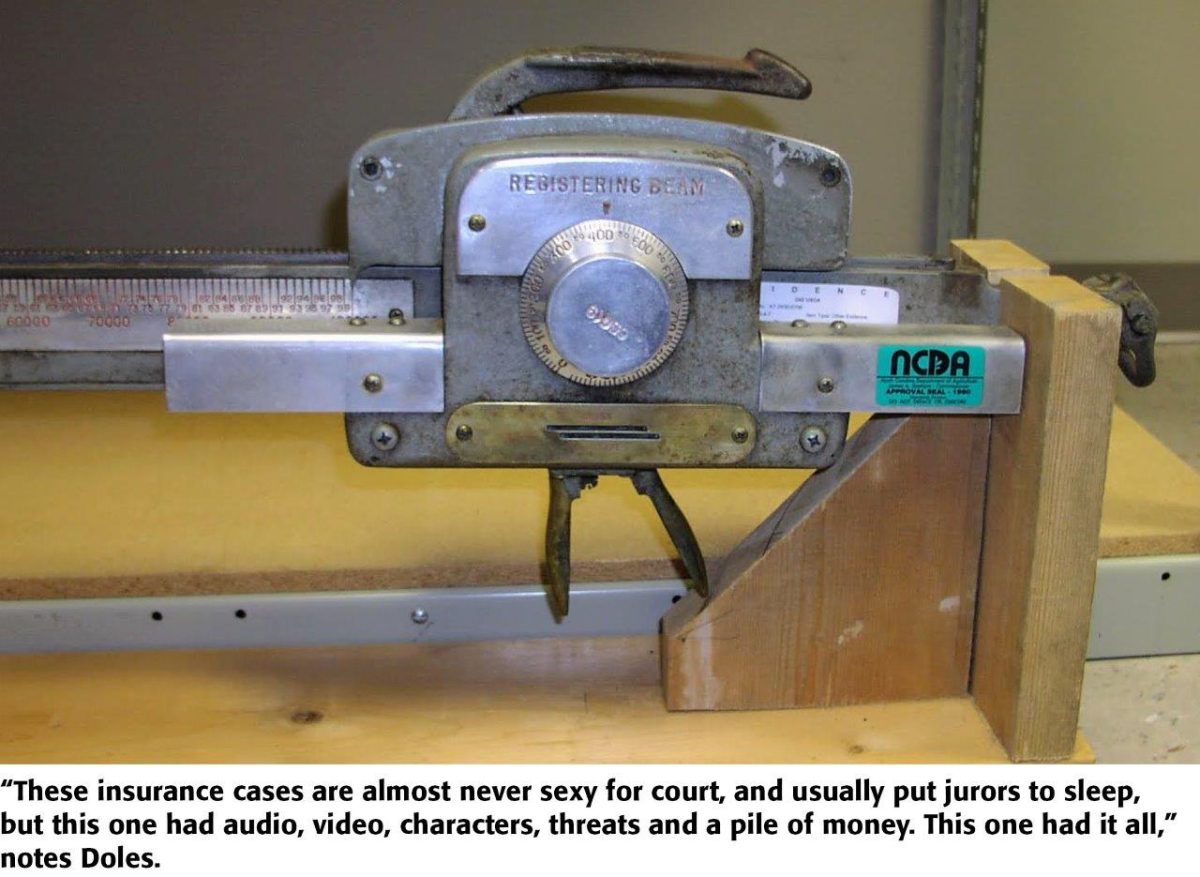
Doles pulls no punches and estimates only 10% of the individuals involved in the overall fraud were arrested. “It was much bigger than we could wrap up, and I’d say we touched about a tenth of those truly participating at some level. The scope of what happened is so much bigger than what could ever be included in a story. The magnitude is tough to describe.”
Hundreds of individuals related to the Stokes fraud slipped away from prosecution, Doles explains. “We only got a few of the greediest ones, and there was no way to get some of the smartest ones. There were just so many people involved that you couldn’t go after everyone. It was unreal, and I remember one guy who had this convenience-type store that burned down, and afterwards he’d sit outside under a tree where the store used to be, and he’d have a cooler filled with cash. Farmers would come by and cash their illegal checks under the tree, right in broad daylight, and leave with cash from the cooler. For sure, $100 million is only a little bit of what was stolen.”
In pointing out the level of graft, Doles also emphasizes the high level of anger from producers that never abused the crop insurance system. “There were so many farmers involved, but there were large numbers of farmers in the same place who weren’t involved in any way; honest farmers who were very upset. They faced higher premiums and the possibility of losing federal insurance on tobacco.”
“Look at it this way,” Doles continues. “The good farmers got paid $2 per pound, while the bad guys got paid $3 per pound and also evaded taxes on part of it. And all of them are competing for the same land and resources, while the bad guys have more money for rent, equipment, chemicals, and you name it. Then the premiums go up and the good guys lose again. That’s how much crop insurance fraud hurts honest farmers.”
Over his career, Doles observed two general types of crop insurance fraud. First, a farmer intentionally grows a bad crop by planting with minimal seed, maybe too deep and spaced by separate zip codes, and claims the plants never came up. It’s not a heap of cash at 75%, but significant if almost no money is pumped into the crop. Second, a farmer makes a fine crop, hides it, and gets paid for the whole shooting match—a method which draws no sympathy from Doles. “It’s got nothing to do with struggling and it’s all about pure greed and getting one over on the guy who farms beside you.”
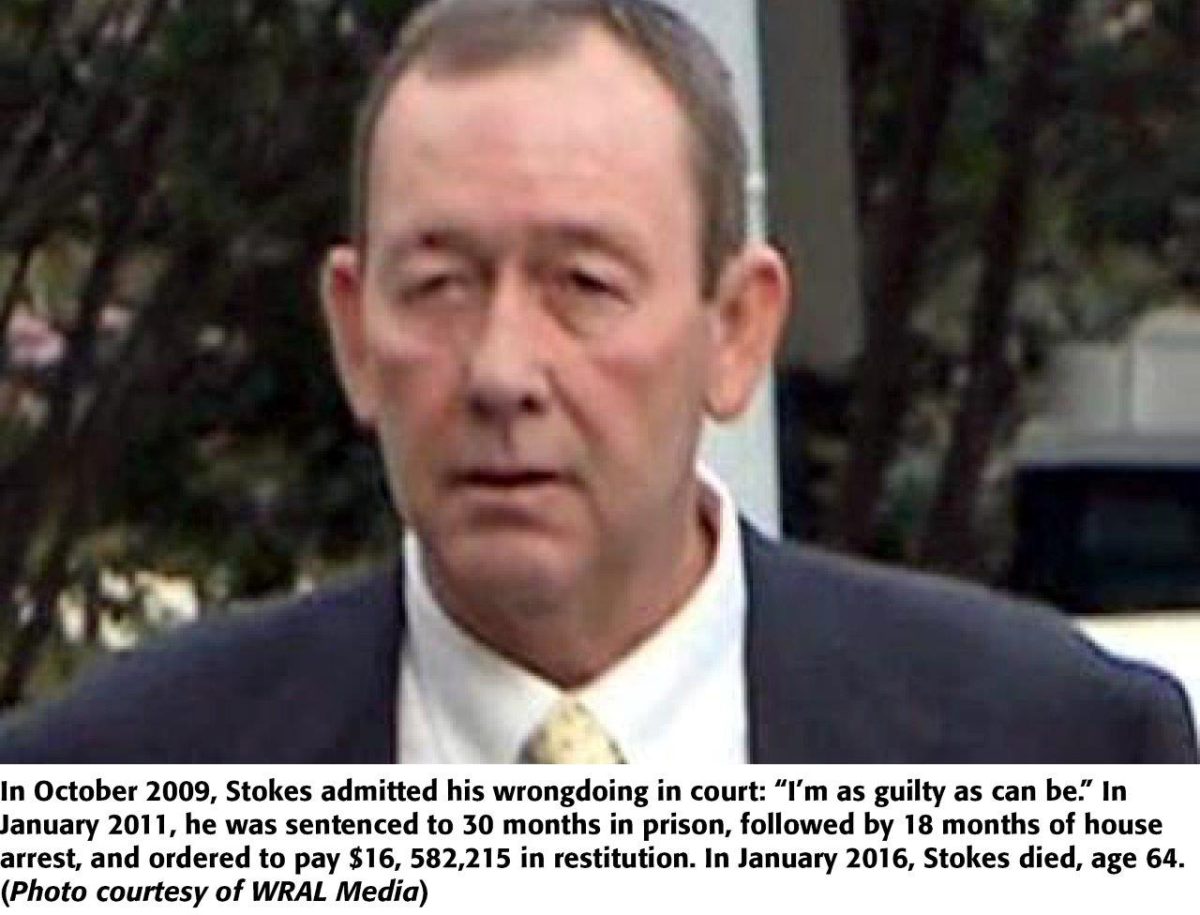
In the Stokes’ case, despite Doles’ disgust, he was never interested in verbal sparring or destroying lives: “Just pay the price and move on. Own up and deal with it.” From the get-go, Doles understood the vagaries of farming, along with the temptations of crop insurance fraud. “An old man hired me when I first started in crop insurance investigations. He told me, ‘Understand one thing. When you’re in this business, you make sure every farmer gets every penny he’s entitled to, but not a penny less or a penny more.”
“And that’s always been my view,” Doles concludes. “I fought just as hard to get folks paid as I did to keep folks from getting paid.”
The business of agriculture will always spawn fraud, and another Robert Carl Stokes will wait in the wings, but a time-tested maxim always holds true: Of evil grain, no good seed can come.
source: agprofessional.com

